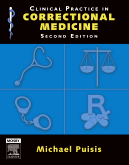|
|
|
| |
 |
|
|

|
 推薦指數:
推薦指數:





|
|
- 內容介紹
|
Clinical Practice in Correctional Medicine, 2nd Edition
By Michael Puisis, DO, SC
608 pages 31 ills
Trim size 8 1/2 X 10 7/8 in
Copyright 2006
Description
Written and edited by 40 practitioners in prison systems and public health from all over the USA, this critically acclaimed text comprehensively covers the medical issues specific to the correctional setting—essential, practical information not available in other books. It explores all major areas of correctional medicine, from intake to hospice care—including clinical management of diseases common among the incarcerated, ethical concerns, organization of health services delivery, patient-provider relations, legal issues, and more. The 2nd Edition delivers completely new sections on nursing and emergency services in the correctional setting, as well as new chapters on hepatitis C, geriatric care, end-of-life care, telemedicine, and other timely subjects.
Reviews
REVIEW OF THE LAST EDITION
"A necessity for all health professionals working in correctional settings. I also recommend it for use in medical schools and schools of public health and health administration. The challenges described are so fascinating and the standards of clinical care and professional behavior presented are so high that the book will attract students to this important field of health care."—JAMA
Key Features
Explores important topics including direct clinical care, chronic and infectious disease prevention and care, women’s health in correctional facilities, alcohol and drug abuse, emergencies, nursing issues, dental care, juvenile care, preventive health issues, quality improvement, ethical and legal issues, and end-of-life care.
Covers all major areas of mental health care, including suicide prevention, outpatient mental health programming, crisis intervention, and the behaviorally disordered patient.
Offers chapters on sexually transmitted diseases and tuberculosis co-authored with representatives of the Centers for Disease Control, to provide reliable information on screening for these diseases consistent with national guidelines.
|
|

歡迎使用國民旅遊卡
|
 其他相關書藉
其他相關書藉
|
|
|
|
|
| ◆ Evidence-Based Health Care and Public Health, 3rd Edition - How to Make Decisions About Health Services and Public Healt |
| - 內科(家醫科及實証醫學) |
| - 作者:Muir Gray, Kt, CBE, DSc, MD |
| ◆ Clinical Dermatology, 4th Edition - A Color Guide to Diagnosis and Therapy(已絕版) |
| - 內科(家醫科及實証醫學) |
| - 作者:Thomas P. Habif, MD |
| ◆ 自我醫護順勢療法 |
| - 內科(家醫科及實証醫學) |
| - 作者:中村裕惠 醫師 (巫靜宜 譯) |
| ◆ 跨越醫療專科的實證實務 (下冊) , 2nd Edition |
| - 內科(家醫科及實証醫學) |
| - 作者:Tammy Hoffmann, |
| ◆ Geriatric Clinical Advisor - Instant Diagnosis and Treatment, Textbook, Website & PocketConsult Handheld Software |
| - 內科(家醫科及實証醫學) |
| - 作者:Tom J. Wachtel, MD |
|
--- more |
 [ 積點系統 ]
[ 積點系統 ]
|
| 您已經累積多少點數您知道嗎?別忘了登錄會員,察看您的點數,獎品就等您來拿喲! |
 [ 訂購辦法 ]
[ 訂購辦法 ]
|
| 您還不知道要在本網站如何購物嗎?我們將會提供給您訂購的方法及購物相關資訊喲!讓您彈指間取得想要的書藉。 |
| |
|

